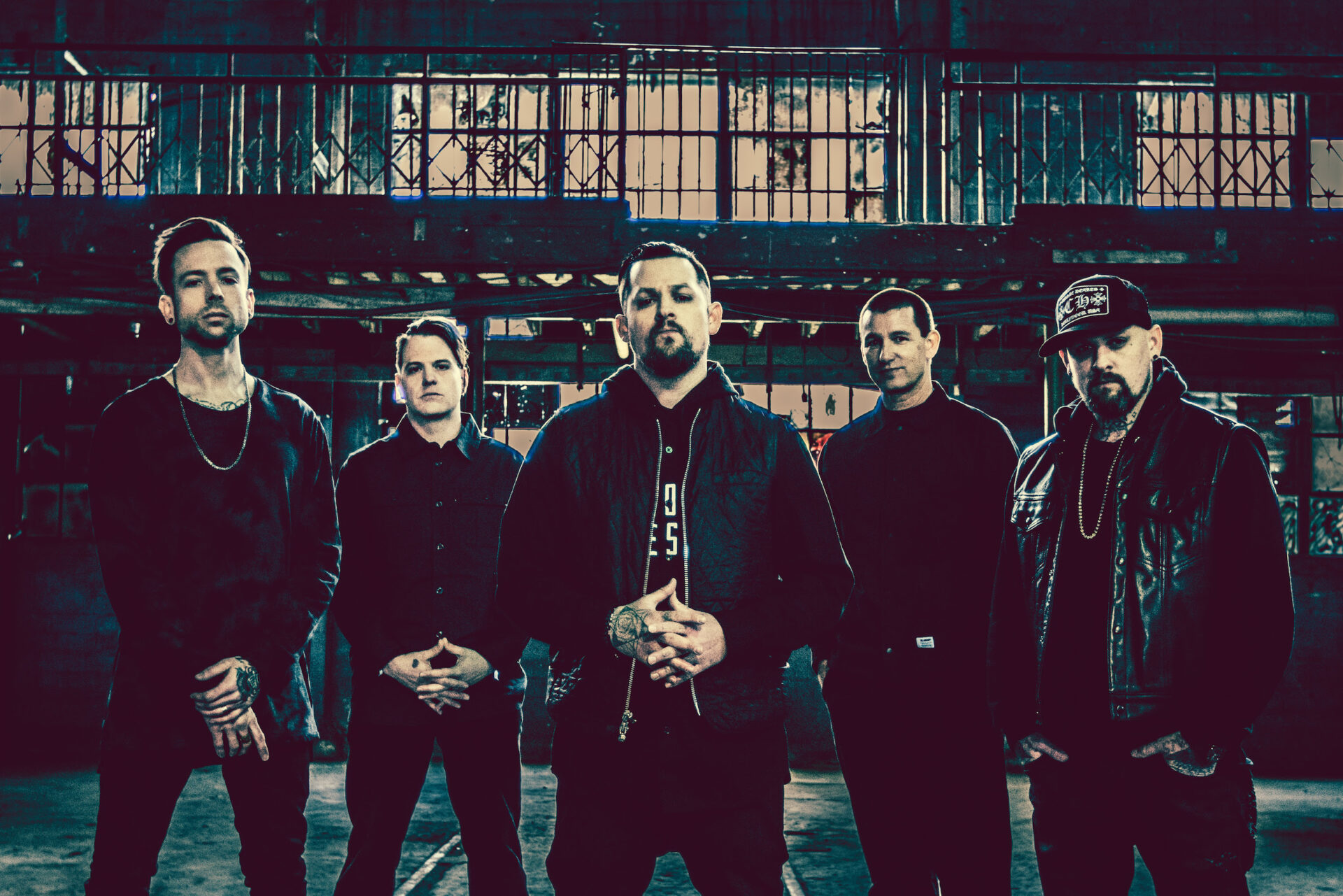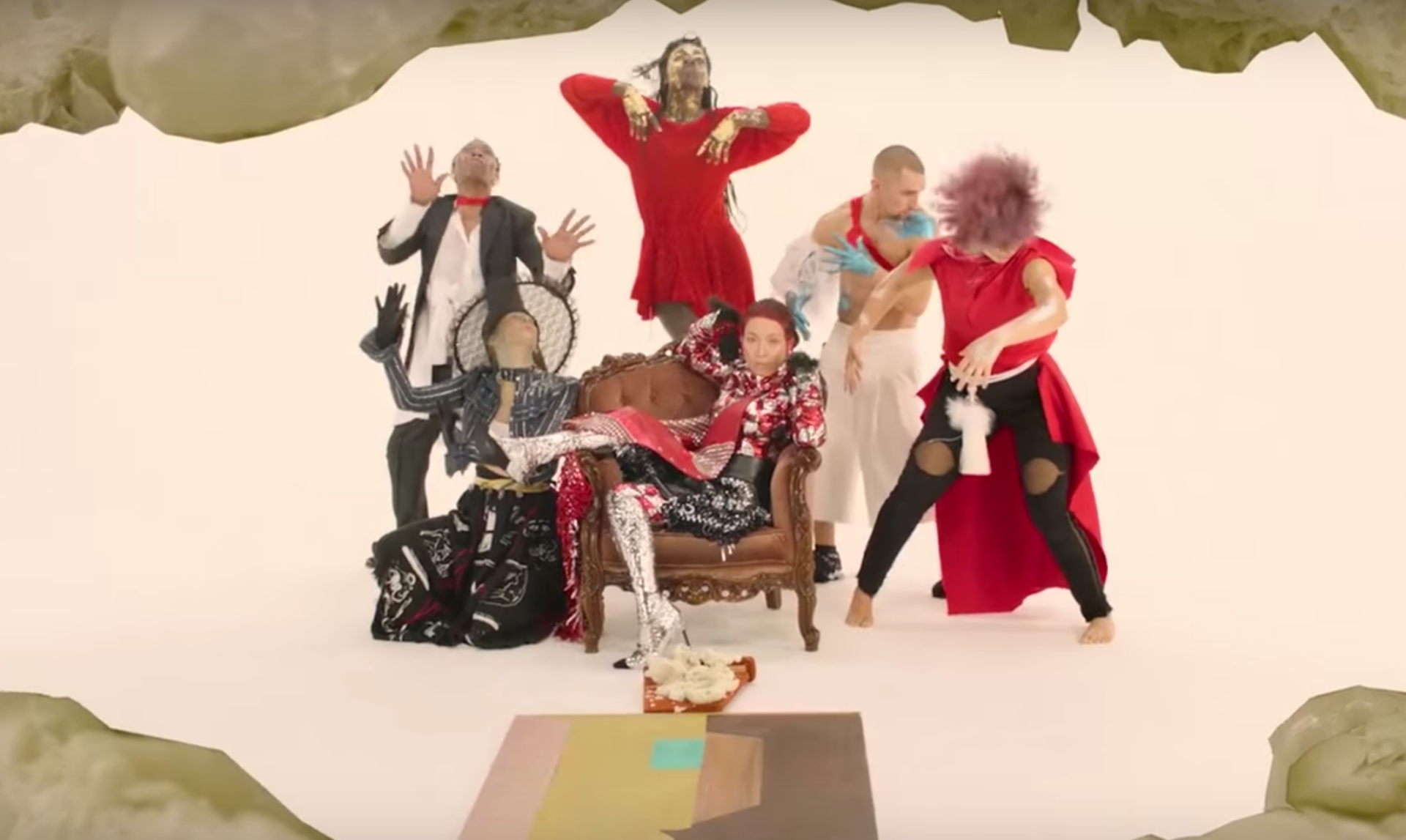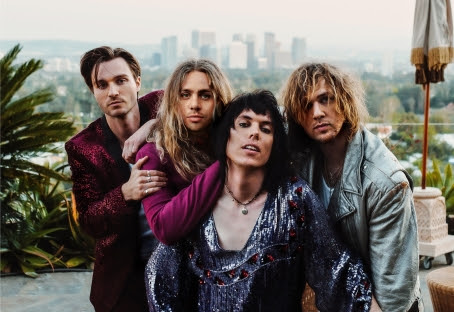If you’re at all familiar with Good Charlotte’s discography, chances are there’s at least one song you personally connect with. A song that understands you, a song that describes a situation in your life, a song that seems to understand how it is you feel – it may be your favorite song, and Good Charlotte might even be your favorite band. With relatable lyrics that speak honestly of the struggles they’ve been through and maintain a persistent feeling of hope through it all, how could they not be? Even if their music doesn’t relate to your own life experiences, there’s something undeniable about how honest they’ve been since the start, and their energetic live shows are a guaranteed good time. Yet though Good Charlotte have achieved a level of celebrity status that many of their peers haven’t, they’ve maintained a humble, down-to-earth perspective and a level-headed outlook on their success.
This has never been more evident than in recent years. On “Life Changes”, the opening track to 2016’s Youth Authority, Good Charlotte sang, “We almost died / Learning how to survive the fast life / You know they say that nothing lasts forever / You know they said we’d never stay together / It’s a long way down, can’t turn back now / Going through these life changes / Going through these life changes.” Glad to be back, Youth Authority showed they were aware this might not be forever – but anyone listening sure hoped it would be.
Two years later, with their seventh album Generation Rx (out now on BMG / MDDN), Good Charlotte are going back to their roots. Generation Rx is an album less about the band experience, and more an album geared to cut deep with fans, with lyrics about the opioid crisis, mental illness, and even families separated by I.C.E. When Substream talks to guitarist Billy Martin a few days before the album’s release, he’s excited, but also “anxious, maybe more anxious than I’ve felt in a while.” But it’s a good anxious, because “Things feel very real again for the band.”
In September 2011 – less than a year after releasing their fifth album, Cardiology – Good Charlotte announced a hiatus. “Towards the end of our record cycle, before we took the hiatus, it was not the best period for Good Charlotte,” Martin admits. As the members were starting to get married and have children, time away on the road took its toll, and they began to feel frustrated when shows didn’t go the way they wanted. He continues that, “A lot of that is getting jaded and expecting every show to be awesome and every opportunity to get better and better, but any career you have to weather the ups and downs; that’s part of being in the entertainment industry.” After a few years apart, a pool party at Benji’s house gave them the chance to reconnect and all hang out together. “We’d seen each other one-on-one, or phone calls, but we hadn’t all gotten together as a band and just hung out. That was a moment where we all sat around thinking like, ‘Man, this is really fun – I miss these guys. This is my family; this feels right, to be together.'”
Now – nearly three years after announcing their reunion in November 2015 –”We’re in a place where everybody is happy being [in] Good Charlotte; we’re really proud of the music, we’re really proud of where our band sits in the industry right now, or sort of in the scene that we came up with.” Good Charlotte are back, and this time, they’re doing it on their own terms. This means not doing things they don’t want to do, and “trying to make sure we enjoy every moment.” Martin feels the band are “lucky” – younger bands are pressured to say yes to every opportunity, “and you have to do a lot of shit that you don’t want to do” – but anyone watching knows they haven’t found this freedom by chance. Rather, after twenty years of hard work, Good Charlotte have proven themselves and earned the right to do the band on their own terms.
Good Charlotte’s first five albums were released on major labels (the first four were released on Epic / Daylight; Cardiology was released on Capitol); post-hiatus, Youth Authority was released independently on MDDN. For Generation Rx, they’ve partnered with BMG – their first major label release in eight years. Martin explains that “we got the best of both worlds with this one.” The band finished the record on their own, but sought label support because “There’s a lot of things that labels can help you do that you can’t do independently… but we also wanted the freedom of being able to do whatever we wanted to do musically without anyone coming in to say how they felt about it.” Luckily, BMG liked what they had to say – “We presented the record and they were like, ‘We totally get it – we see where Good Charlotte’s at. We love the music'” – making it “a really easy partnership” that gave the band the flexibility to do what they wanted to do, while having the support of a major label to promote the record and help it reach a larger audience than they could on their own.
It’s important to Martin that the band are allowed to be themselves and do what they want; that freedom of expression is how they’ve found confidence. Sometimes being different means standing out, and that’s not always easy. Good Charlotte’s early records spoke of the struggles of not fitting in, first in high school (“Little Things”, “The Click”), then in the world in general (“The Anthem”). It’s no surprise that their fans have long been outsiders as well. “That’s how we all felt as kids and to some extent, our band has always felt like that in the industry,” Martin relates. Even as they found success, Good Charlotte have remained outsiders of sorts; though often described as “pop-punk”, they’ve never quite fit the label, and 2007’s Good Morning Revival explored the reality of being an outsider in Hollywood. “We’ve always sort of been the misfits of the industry, where people weren’t really quite sure where to put us,” Martin concedes, “and I think that matches with our fan base, and where we’re at now – just sort of being comfortable being unique and being yourself.”
The theme of self-confidence ties in to “Shadowboxer”, which explores the negative things we often tell ourselves, and how tough it can be to get rid of these thoughts (“And even when I ran away / The voices in my head they stayed / I could always hear them / I could always hear them”, Joel sings in the first verse). These things aren’t always easy to express – but it can be empowering to do so. The video for “Shadowboxer” sees people of all different backgrounds staring at their reflections in the mirror; looking distressed, their faces soon flash to skulls, which was “our way of saying that everyone has that dark inside of you that’s there and that you struggle with. The outside of you might be happy but on the inside, you don’t necessarily see the demons.” These are thoughts that – despite their outer success – the members of Good Charlotte can still relate to. Countless lives have been lost in the entertainment industry this year, and Martin stresses that fame and fortune don’t mean you’re happy. “That’s just so not the case for anybody. That’s never gonna fix anyone’s problems…. Whether you’re a person who works a regular 9-to-5 job and you might struggle with some things in your life, or you’re a big famous rock star, it doesn’t mean you don’t have the same issues, you don’t have the same insecurities, you don’t have the same doubts every day when you wake up thinking about things.”
Martin feels that fans connected with the “emotional, personal” lyrics on Good Charlotte’s early records “cause they felt like, ‘Oh, this band is speaking to me’” but admits that “later in our career we kinda got away from that a little bit. Maybe you don’t think about that stuff so much when life is good.” That’s no one’s fault; it’s only natural to write about what you’re surrounded by. Over time, having children changed their perspective, as they’ve begun to look at the world their kids are growing up in, and the situations they’ll be experiencing. When it came time to write the new album, Martin says, “I think it gave room for the twins to find lyrics that were very truthful and meaningful and deep and dark and [from] a place that maybe hasn’t really felt comfortable in a while, and it was totally worth it, cuz it made a huge impact on the record.”
On Generation Rx, Good Charlotte sing about addiction (“Actual Pain”), self-hate (“Self-Help”), and family troubles (“Leech”), with enough truth to let you know they’ve been there and they know your pain is real, but with enough clarity to bring hope to those still in the midst of the storm: the piano-driven “Cold Song” begins, “I want you to know, you’re not alone.” Throughout their career, as Good Charlotte have sung of the most trying moments in life, there has always been a sense of optimism: a notion not just that things can get better, but that they will. When asked how they maintain that positive outlook when writing about difficult times, Martin shares that music was what provided them an escape when dealing with their own demons. “When we were in dark places at any point in our lives, music was definitely the thing we turned to,” he says. “You put your headphones on and put your favorite record on, and instantly you’re somewhere else, and you’re not in that moment.”
For many people, Good Charlotte has been that band to get them through difficult times. Fans would share “some really heavy stories” at meet-and-greets; it was something that happened often, but never lost its impact. “You’re there getting ready for the show, getting ready to meet some fans, [and] you might not realize that the next person in line that’s waiting to come up to you has been waiting eight or nine years to tell you some really heavy story about their life and how your music saved them,” Martin recounted. “And of course it’s always nice to hear that our band was the catalyst to help them get back to a better place, but it’s shocking too, every time.” The band discuss these fan interactions often, because “you can’t not be affected by that stuff”, and when it came time to write this album, “I remember the twins [saying] at one point, ‘We’ve really gotta reach out with this next record and make sure that we’re doing what we did – that we’re able to help people.’”
And help people they have. The magnitude of their fan connection isn’t lost on Martin, and he’s grateful in reflecting on the amount of people that have turned to Good Charlotte’s music. “It’s crazy to think that we’re that band – you don’t realize that you’re somebody’s favorite band. Everybody has a favorite band – if you love music, you have a favorite band, and it’s cool to think that we’re so many different people’s favorite band.” Martin doesn’t want to take all the credit – he acknowledges that perhaps it wasn’t Good Charlotte’s music that directly helped them, perhaps “it’s more about just having a connection with music” and it could’ve been any band they chose – and he’s sincere in sharing his gratitude for their fans. “We’re thankful that so many people chose Good Charlotte as that band in their life. That was a big part of this record, was making sure that we had those songs that could reach out and maybe give some people some hope when they didn’t think they had any.”
In addition to reminding fans that “there is hope in the dark places in your life”, Martin wants fans to know that “this record is very real to us.” Youth Authority was a high-energy batch of songs that they made quickly to “let people know that Good Charlotte’s back and we’re doing it again”, but when it came time to make Generation Rx, “we wanted to make another record that would connect and that was another chapter in our careers. Lyrically, hopefully it helps people, but I want people to know that it’s serious to us – that Good Charlotte is not just a thing we’re going to do once in a while again, that we’re back to this a hundred percent, and we’re all in.”
Though it hasn’t always been an easy ride – early in their career, negative reviews and critics would get under his skin and cause Martin to second-guess what the band were doing – after two decades in the game, Good Charlotte have fought through the hard times to earned respect in the industry, and now they’re here for good. “We had too much fun making this record,” Martin shares, and mentions that a short record (Generation Rx has nine songs, clocking in at just over half an hour) was “sort of a way of saying, ‘Don’t worry, we’re gonna make another record again soon.’” They’ve decided to not put any set rules or timeframes on their career, in order to keep going at a pace they find sustainable. After returning from the hiatus, they’d initially planned to not tour for longer than two weeks at a time so they wouldn’t have to leave their families, “but we’re getting ready to go on an almost six week tour in October and November – so it shows that everybody is enjoying it and we’re already breaking our own rules to do even more shows than we planned on – so yeah, we definitely plan to keep this going.”
When asked for his closing thoughts, Martin’s words were simple. “I’m just thankful that this many years later that people still care and people are still giving us a chance to do what we love doing and I appreciate and we’re thankful for it,” he shared. There’s no doubt he’s entirely genuine in saying so. Good Charlotte still care, they very much do, and so do their fans. Chances are, they always will.
Generation Rx is out now. Good Charlotte will be on tour with Sleeping With Sirens, Knuckle Puck, and The Dose this fall; head to their website to see all dates.













